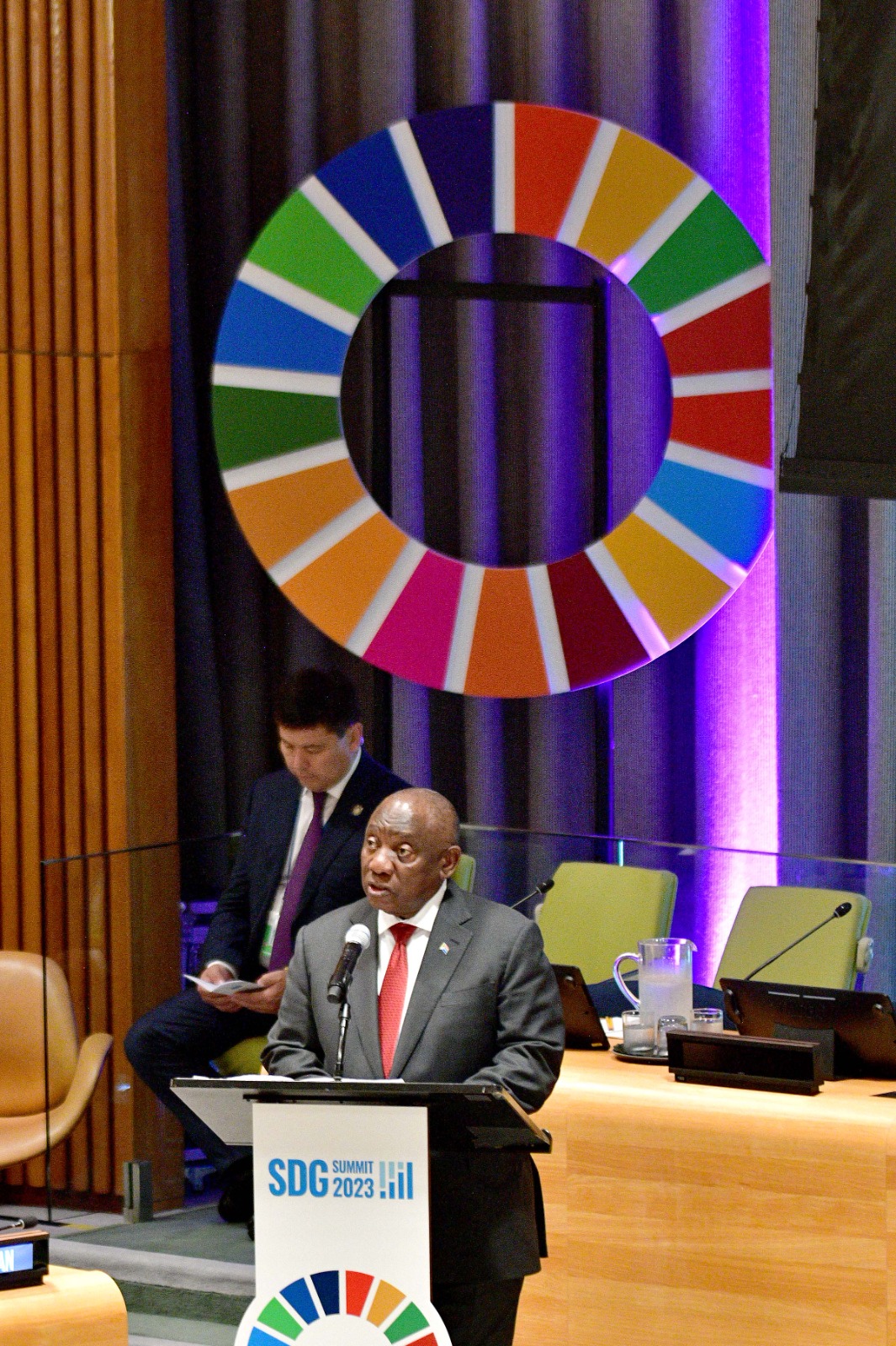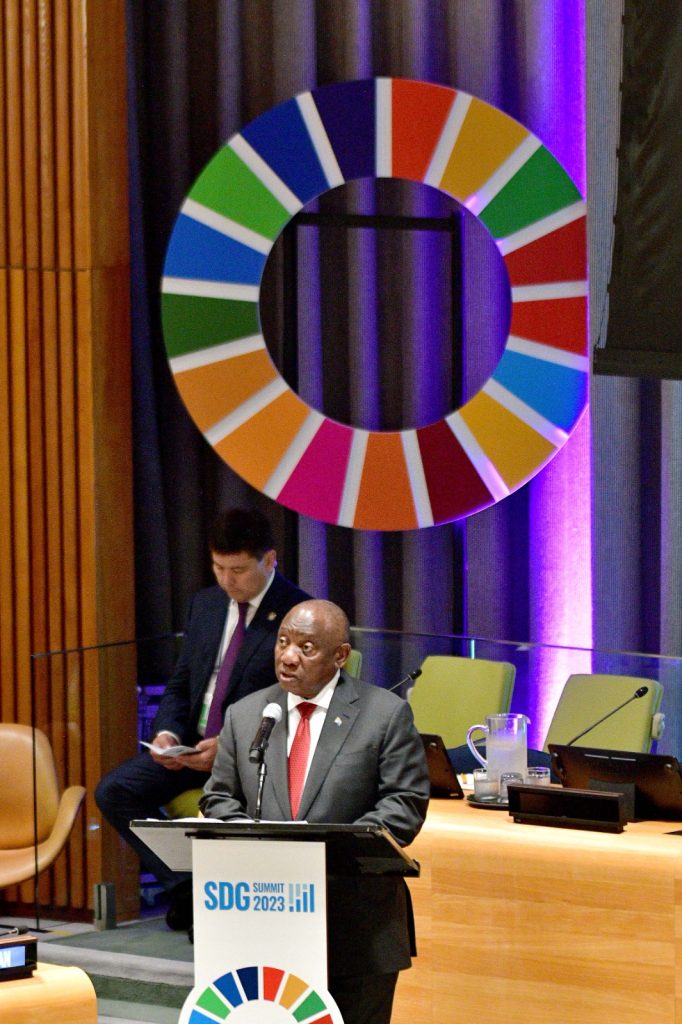Published
7 months agoon

President Cyril Ramaphosa has called for Africa to achieve self-reliance in pandemic prevention, preparedness and response (PPPR). He made the call at a meeting on the margins of the 78th Session of the United Nations General Assembly.

Ramaphosa said that Africa should set its own agenda to fit into the global plans, and that it is justified in seeking to achieve self-reliance in PPPR. He also said that Africa experienced over 100 infectious disease outbreaks a year, most of which it manages to contain.
The President said that the relative success of Africa’s COVID-19 Response Strategy should be studied and documented, and that the learnings can form the basis of an informed, proactive strategy.
He said that together, Africa has built a solid foundation for PPPR by strengthening its public health institutions, initiating a pharmaceutical manufacturing strategy, establishing a model for continent-wide pooled procurement and exposing African products to the global market through the Africa Medical Supplies Platform.
Ramaphosa said that Africa now has a window of opportunity to maintain political will and investor interest to drive significant investments towards developing regional PPPR capacity. He said that Africa needs to focus on a few critical areas, including:
Ramaphosa said that the Bureau of the Heads of State and Government have agreed to establish the Africa Epidemic Fund, and that Africa needs to swiftly conclude the necessary statutory processes and replenish the fund.
He said that, as the AU COVID-19 Champion, he has tabled a proposal to establish a regional legal instrument as a PPPR cooperative mandate that would be triggered by a declaration of a public health emergency of continental security or international concern. He said that this legal instrument should outline the actions that member states can collectively take and appropriate modalities for the region’s interaction with the world during the next pandemic.
Ramaphosa said that pandemic preparedness requires Africa to achieve its ambitious manufacturing goals. He said that this needs to be a collaborative effort that brings together the Africa CDC, the Partnerships for African Vaccine Manufacturing, AUDA-NEPAD and the AfCFTA Secretariat with other relevant continental and global partners and the private sector.
He said that Africa needs more investment into research and development, building on its diversified clinical trial expertise and drawing from indigenous knowledge systems. He said that Africa must encourage the co-development of products to secure ownership of intellectual property.
Ramaphosa said that the high-level working group on health manufacturing was established to coordinate and monitor the impact of such partnerships. He said that the working group will also monitor the progress made by large procurers of health products like GAVI, UNICEF, PEPFAR and the Global Fund.
He said that this follows the Bureau’s call for these procurers to purchase at least 30 percent of the products destined for Africa from African manufacturers.
Ramaphosa said that, as Africa builds its regional capacity, it must also position itself prominently in the global PPPR negotiations. He said that Africa needs a unified voice and common positions to advance the interests of its continent and its people.
He said that Africa needs to be well represented in key global fora, like the WHO’s consultative process towards an interim medical countermeasures coordination mechanism, the G20 as part of the AU’s new membership, the G7 MCM Delivery Partnership and the informal Johannesburg process.
Ramaphosa said that South Africa was a co-chair of Access to COVID-19 Tools Accelerator, or ACT-A, and that there is much that Africa can learn from the experience of that initiative. He said that Africa concurs with the ACT-A External Evaluation findings that it was not a perfect instrument and fell short of attaining equity. He said that it did not contribute as effectively as it could to the last-mile delivery and strengthening of health systems.
However, Ramaphosa said that ACT-A did establish solid collaborative networks that together raised $ 24 billion in financing, delivered 1,96 billion vaccine doses to low- and middle-income countries and procured over $700 million worth of PPE for health workers. He said that Africa can build on this collective capacity whilst addressing the mistakes of the past.
Ramaphosa said that the combination of climate change and the increased movement of people has caused an increase in the frequency of outbreaks worldwide. He said that this means preparation is urgent and will not wait for Africa to make up its minds at the Intergovernmental Negotiating Body.
It is for this reason that Ramaphosa said that Africa supports the establishment of an interim medical countermeasures coordination mechanism.
Hear HHopewell CHIN’ONO boldly assert that the GodIsIt mantra is a toxic and fatally defective idea
WHAT IS WEALTH? IS IT THE OPPOSITE OF POVERTY? WHAT IS POVERTY ABSENT THE HUMAN FACTOR?
LIFE IS CREATED OUTSIDE HUMAN INFLUENCE FOR ANYONE TO REFUSE TO HOLD ON EVEN FOR ONE MORE SECOND OF IT.
WHEN PASSION MEETS THE WILL, PASSION AND DETERMINATION, WHAT SHOULD FOLLOW?
TALKING TO THE MOON?
HOW CAN A SINGLE HUMAN OF FLESH PRETEND TO KNOW ALL YET REMAIN HUMAN?




Warning: Undefined variable $user_ID in /home/iniafrica/public_html/wp-content/themes/zox-news/comments.php on line 49
You must be logged in to post a comment Login